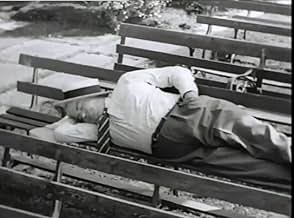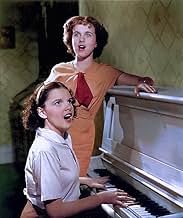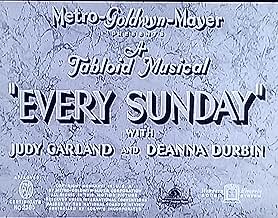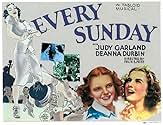Two teenage girls lend their fantastic singing voices to the cause when the city council threatens to replace the orchestra led by one girl's grandfather as the regular entertainment at the ... Read allTwo teenage girls lend their fantastic singing voices to the cause when the city council threatens to replace the orchestra led by one girl's grandfather as the regular entertainment at the Sunday concert-in-the-park series.Two teenage girls lend their fantastic singing voices to the cause when the city council threatens to replace the orchestra led by one girl's grandfather as the regular entertainment at the Sunday concert-in-the-park series.
Clem Bevans
- Man playing checkers
- (uncredited)
Jules Cowles
- Man in Audience
- (uncredited)
Paul Irving
- Mr. Bixby
- (uncredited)
Wright Kramer
- The Professor
- (uncredited)
Thomas Pogue
- Mr. Barfogle
- (uncredited)
Richard Powell
- Pop, Judy's Father
- (uncredited)
Kathryn Sheldon
- Woman Gotten out of Bath
- (uncredited)
Tammany Young
- Man Sleeping on Bench
- (uncredited)
- Director
- Writer
- All cast & crew
- Production, box office & more at IMDbPro
Featured reviews
Instead of making foolish comments praising one over the other (like comparing apples to oranges), fans of JUDY GARLAND and DEANNA DURBIN ought to just sit back and relax while watching this harmless little piece of musical fluff made simply to give audiences a look at two up-and-coming stars of the future.
Durbin's fans are insisting that she was the superior talent with the real singing voice and Garland fans are insisting that even then she was beautiful and sings up a storm on something called "Americana"--which, by the way, Garland does handle with finesse even though it's not even worthy of all her energies.
But both of them perform in a professional manner. Durbin's soprano voice is lovely and there's no reason for someone to complain that this type of voice "should not be coming from a child" of fourteen, instead of giving credit where it's due. It's obvious that she already had lots of vocal training and was already capable of handling operatic material and there's nothing wrong with that.
Judy too is in good voice, even though I personally think the studio could have chosen a more memorable song than "Americana" for her to belt out.
Anyway, together they blend nicely in a simple story about two girls who decide to do something when the local band concert is not attracting enough patrons to the park. They take matters into their own hands and come up with the idea of performing with the band as an added attraction. The stunt works and before you know it, they've attracted a good sized audience.
Audiences in '36 were probably pleased to see two such talented youngsters demonstrating their musical skills in a short film.
Durbin's fans are insisting that she was the superior talent with the real singing voice and Garland fans are insisting that even then she was beautiful and sings up a storm on something called "Americana"--which, by the way, Garland does handle with finesse even though it's not even worthy of all her energies.
But both of them perform in a professional manner. Durbin's soprano voice is lovely and there's no reason for someone to complain that this type of voice "should not be coming from a child" of fourteen, instead of giving credit where it's due. It's obvious that she already had lots of vocal training and was already capable of handling operatic material and there's nothing wrong with that.
Judy too is in good voice, even though I personally think the studio could have chosen a more memorable song than "Americana" for her to belt out.
Anyway, together they blend nicely in a simple story about two girls who decide to do something when the local band concert is not attracting enough patrons to the park. They take matters into their own hands and come up with the idea of performing with the band as an added attraction. The stunt works and before you know it, they've attracted a good sized audience.
Audiences in '36 were probably pleased to see two such talented youngsters demonstrating their musical skills in a short film.
In itself, this is a lightweight short feature with a predictable story, but it is well worth seeing as a pleasant part of cinema history. Seeing Deanna Durbin and Judy Garland together so early in their careers is a treat for anyone who has enjoyed their later pictures, and their energy and obvious talent more than make up for any lack of depth in the rest of the movie.
The plot is a simple one, with the two young women devoting themselves to saving a local concert series. What's interesting about it is seeing Durbin and Garland perform, since even at such a young age the difference in their styles is already pronounced. Deanna and Judy were both clearly ready for bigger opportunities.
This kind of feature probably doesn't hold an interest for a wide audience today, but for those who appreciate the classic musicals, it's worth seeing as a piece of movie history.
The plot is a simple one, with the two young women devoting themselves to saving a local concert series. What's interesting about it is seeing Durbin and Garland perform, since even at such a young age the difference in their styles is already pronounced. Deanna and Judy were both clearly ready for bigger opportunities.
This kind of feature probably doesn't hold an interest for a wide audience today, but for those who appreciate the classic musicals, it's worth seeing as a piece of movie history.
This one reeler produced by MGM in 1936 showcases the talents of two of its young stars under contract, Judy Garland and Deanna Durbin. In a way, these short films were promotional trailers that featured new talent in front, or behind the camera. Felix Feist directed this one which was a way to promote the two talented stars to the public.
The story is simple enough. The orchestra that entertains in a public park every Sunday doesn't get the attention it deserves. Enter two music aficionados, Judy and Edna, who love to hear the band play conducted by one of their grandfathers. Two of the town's elders sensing there is no public for this type of entertainment have decided to cancel their Sunday concerts in favor of a more popular orchestra that will attract a wider audience.
The two girls embark in a promotional tour of their own doing what they only know, calling and running errands and being helpful to their neighbors in exchange for a promise they will attend the park concert next Sunday. Well, that day comes, and to their surprise, hardly anyone comes as the music starts. The two girls decide to take matters into their own and ask the conductor to play a song for them to sing. The result is clear, people all over the park flocks to hear the talented young singers, thus ensuring the orchestra's existence.
Of course, the only attraction of the short film is the inspired singing by the two stars who are wonderful in their rendition. Ms. Durbin's operatic voice blends well with Ms. Garland's natural one creating a lovely duet.
Don't miss it whenever it shows on TCM!
The story is simple enough. The orchestra that entertains in a public park every Sunday doesn't get the attention it deserves. Enter two music aficionados, Judy and Edna, who love to hear the band play conducted by one of their grandfathers. Two of the town's elders sensing there is no public for this type of entertainment have decided to cancel their Sunday concerts in favor of a more popular orchestra that will attract a wider audience.
The two girls embark in a promotional tour of their own doing what they only know, calling and running errands and being helpful to their neighbors in exchange for a promise they will attend the park concert next Sunday. Well, that day comes, and to their surprise, hardly anyone comes as the music starts. The two girls decide to take matters into their own and ask the conductor to play a song for them to sing. The result is clear, people all over the park flocks to hear the talented young singers, thus ensuring the orchestra's existence.
Of course, the only attraction of the short film is the inspired singing by the two stars who are wonderful in their rendition. Ms. Durbin's operatic voice blends well with Ms. Garland's natural one creating a lovely duet.
Don't miss it whenever it shows on TCM!
Every Sunday is an eleven minute short subject featuring the talents of two of its young juvenile contract players, a pair who would develop into players of note in the future. It's interesting and entertaining to see the contrasting styles of Judy Garland and Deanna Durbin as they perform at a Sunday concert for Deanna's uncle.
Of course no one knew how big both of these young ladies would get to be. I've always wondered why Mayer kept Garland and let Durbin go to Universal. L.B. always had pretensions to culture and this was the guy who had Jeanette MacDonald at his studio and later on hired such lovely soprano voices as Jane Powell, Ann Blyth, Doretta Morrow, etc.
Judy certainly had her glorious career at MGM, but she paid a heavy price for it. Deanna, along with Abbott&Costello and several Gothic horror monsters preserved Universal pictures. She was smart enough to get out at the top and make it stick.
So, in their salad days, Deanna Durbin and Judy Garland.
Of course no one knew how big both of these young ladies would get to be. I've always wondered why Mayer kept Garland and let Durbin go to Universal. L.B. always had pretensions to culture and this was the guy who had Jeanette MacDonald at his studio and later on hired such lovely soprano voices as Jane Powell, Ann Blyth, Doretta Morrow, etc.
Judy certainly had her glorious career at MGM, but she paid a heavy price for it. Deanna, along with Abbott&Costello and several Gothic horror monsters preserved Universal pictures. She was smart enough to get out at the top and make it stick.
So, in their salad days, Deanna Durbin and Judy Garland.
We are very fortunate to have such historic pieces of film preserved. Deanna and Judy captured on film at the very beginning of their individual spectacular careers. Two diverse voices blended in a brief eleven minutes. Many other ledgendary performers were filmed at the outset of sound, and these may be the only records in existance of their performances. Living history.
Did you know
- TriviaThis film was not (as is often reported) a "screen test" of sorts produced by MGM to help the studio decide which of these two girls, Deanna Durbin or Judy Garland, to keep under contract. Durbin was released by MGM and signed by Universal prior to this movie's production. A blurb on 1 June 1936 in "The Hollywood Reporter" stated "Universal had changed Canadian-born Edna Mae Durbin's name to 'Dianna' [sic]." This movie, it appears, was not produced until at least July 1936, by which time Durbin had already been signed by Universal and cast in her debut vehicle, Trois jeunes filles à la page (1936). The reason she appeared in this film was reportedly due to a provision in her MGM contract which entitled the studio to request her services for up to 60 days following its termination, provided she was not already shooting a film at her new studio. As filming on "Three Smart Girls" was not scheduled to begin until September 1936, Durbin found herself back at MGM making this short with Garland. This is why, although her on-screen character is called "Edna" in the short (Deanna's real name), in the credits she is billed under the name by which she would soon become internationally famous, "Deanna".
- GoofsWhen the girls are singing, their mouths do not always match the soundtrack.
- ConnectionsFeatured in Il était une fois Hollywood (1974)
Details
- Release date
- Country of origin
- Language
- Also known as
- Каждое воскресенье
- Filming locations
- Production company
- See more company credits at IMDbPro
- Runtime
- 11m
- Color
- Aspect ratio
- 1.37 : 1
Contribute to this page
Suggest an edit or add missing content




























